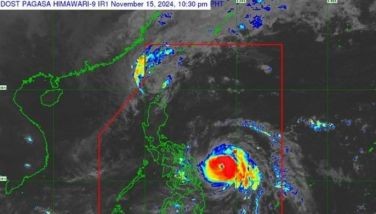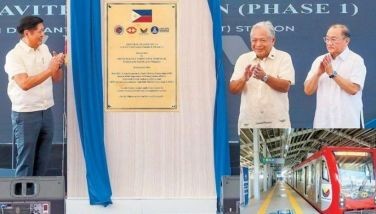China admits instructing envoys to seek support for one-China policy
March 18, 2006 | 12:00am
China is pressing its bid to reunite with Taiwan and admitted yesterday that Beijing has instructed all its diplomatic missions abroad to immediately seek assurances of support from their host governments for the One-China policy.
Political Counselor Deng Xijun of the Chinese embassy in Manila, said in a press conference that Chinese Ambassador Li Jinjun was under instructions from Beijing to seek Manila’s support for China in pushing for the reunification of China and Taiwan by opposing Taipei’s bid for independence.
Deng made his statements as part of China’s efforts to seek support for its reunification with Taiwan following Taiwanese President Chen Shui-bien’s scrapping of the National Unification Council and guidelines for unification.
A ranking official of the Department of Foreign Affairs said Li visited the DFA offices in Pasay City to brief the Philippine government on the situation in the Taiwan Strait and seek a concrete form of support for the Chinese government by issuing a statement.
In a statement issued by the DFA, the Philippines expressed concern over the recent actions and statements between China and Taiwan on the cross-Straits issue, saying this may undermine the process of dialogue and peace-building in the region.
"The Philippines adheres to the One-China policy and hopes that the issue will be resolved peacefully and in a manner conducive to the peace and stability in the region," the Philippine government statement said.
Deng said the Chinese government appreciated the Philippines’ statement of support on the Cross Straits issue and the country’s emphasis on its adherence to the One-China Policy.
However, the Philippines statement did not categorically disapprove of Chen’s actions.
Diplomatic sources said the Philippines satisfied China’s request to issue a statement of support but did not make a strong statement because the Philippines must balance its relations with Taiwan, which is host to almost 100,000 overseas Filipino workers (OFWs).
"China asked countries all over the world to help stop Taiwan’s dangerous move toward independence. We are glad that the Philippine government reiterated the commitment to the One China Policy and supports it," Deng said.
The Chinese embassy also distributed copies of a statement issued by the Taiwan Work Office of the Central Committee of the Communist Party of China and Taiwan Affairs Office of the State Council condemning Chen’s decision to cease the function of the National Unification Council (NUC) and cease the application of the "National Unification Guidelines."
Although Chen did not use the term "abolish," Beijing claimed that the Taiwanese leader had long planned to use the word "cease" instead and "he was merely playing on words in order to mislead the people of Taiwan and the international public opinion."
"He claims that his decision does not involve changing the status quo. But it is crystal clear that his real purpose is to step up his Taiwan independence activities through ceasing the application of the Guidelines," the Chinese statement said.
"He accused the mainland of posing a threat to Taiwan. But it is he who is bent on undermining peace in the Taiwan Straits and creating tension in cross-Straits relations," it added.
The Chinese government said it remains firmly opposed to "Taiwan independence" and vowed that "it will never allow the secessionist elements for Taipei’s independence to split Taiwan from China under any name or by any means."
Political Counselor Deng Xijun of the Chinese embassy in Manila, said in a press conference that Chinese Ambassador Li Jinjun was under instructions from Beijing to seek Manila’s support for China in pushing for the reunification of China and Taiwan by opposing Taipei’s bid for independence.
Deng made his statements as part of China’s efforts to seek support for its reunification with Taiwan following Taiwanese President Chen Shui-bien’s scrapping of the National Unification Council and guidelines for unification.
A ranking official of the Department of Foreign Affairs said Li visited the DFA offices in Pasay City to brief the Philippine government on the situation in the Taiwan Strait and seek a concrete form of support for the Chinese government by issuing a statement.
In a statement issued by the DFA, the Philippines expressed concern over the recent actions and statements between China and Taiwan on the cross-Straits issue, saying this may undermine the process of dialogue and peace-building in the region.
"The Philippines adheres to the One-China policy and hopes that the issue will be resolved peacefully and in a manner conducive to the peace and stability in the region," the Philippine government statement said.
Deng said the Chinese government appreciated the Philippines’ statement of support on the Cross Straits issue and the country’s emphasis on its adherence to the One-China Policy.
However, the Philippines statement did not categorically disapprove of Chen’s actions.
Diplomatic sources said the Philippines satisfied China’s request to issue a statement of support but did not make a strong statement because the Philippines must balance its relations with Taiwan, which is host to almost 100,000 overseas Filipino workers (OFWs).
"China asked countries all over the world to help stop Taiwan’s dangerous move toward independence. We are glad that the Philippine government reiterated the commitment to the One China Policy and supports it," Deng said.
The Chinese embassy also distributed copies of a statement issued by the Taiwan Work Office of the Central Committee of the Communist Party of China and Taiwan Affairs Office of the State Council condemning Chen’s decision to cease the function of the National Unification Council (NUC) and cease the application of the "National Unification Guidelines."
Although Chen did not use the term "abolish," Beijing claimed that the Taiwanese leader had long planned to use the word "cease" instead and "he was merely playing on words in order to mislead the people of Taiwan and the international public opinion."
"He claims that his decision does not involve changing the status quo. But it is crystal clear that his real purpose is to step up his Taiwan independence activities through ceasing the application of the Guidelines," the Chinese statement said.
"He accused the mainland of posing a threat to Taiwan. But it is he who is bent on undermining peace in the Taiwan Straits and creating tension in cross-Straits relations," it added.
The Chinese government said it remains firmly opposed to "Taiwan independence" and vowed that "it will never allow the secessionist elements for Taipei’s independence to split Taiwan from China under any name or by any means."
BrandSpace Articles
<
>
- Latest
- Trending
Trending
Latest
Trending
Latest
Recommended
November 11, 2024 - 12:00am




























